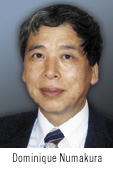
Flex investment gets aggressive.
There is no question that Japanese flexible circuit manufacturers have been leading the global market in both volume and technology. A dozen major Japanese manufacturers cover more than 50% of the global flex market.
The updated total forecast for the top four flex manufacturers (Nippon Mektron, Fujikura, Nitto Denko and Sumitomo Electric) is about 340 billion yen (approximately $2.9 billion) this year, and may represent more than a 40% share of the global market. Most of the manufacturers have been producing huge volumes of 50 micron-pitch fine trace and consumer rigid-flex. They have been installing state-of-the-art equipment in overseas sites, and can therefore be the price leaders in the market and maintain current margins.
The Japanese flex manufacturers have been experiencing slow demand since the summer of 2004. The market has been rebounding since the third quarter of 2005, but the total monthly shipments for manufacturers are still lower compared to the same months in 2004. Total revenue for 2005 will be 10% lower than 2004, but major manufacturers are optimistic that it will rebound this year.
While the exporting business is strong, Japanese manufacturers say that the major reason for the domestic decline has been the slow consumer market in Japan. The major manufacturers have aggressive investment plans this year, expecting continuous growth in the future. In 2005, the top four flex manufacturers will invest about 30-35 billion yen in the flex circuit business - money that will be used to expand manufacturing capacity, including the assembling of the circuits. This may help them keep the leadership position in the global market.
However, Japanese flex makers can't be optimistic about their margins. Domestic customers have been asking for price reductions to meet the cost down requirement for consumer products such as cellular phones and flat panel TVs. Manufacturers have not met these requirements since the seller's market two years ago; now they must contend with a buyer's market.
Another headache for Japanese manufacturers is pressure from Korean and Taiwanese manufacturers. These foreign flex manufacturers have been offering very aggressive prices for domestic customers in Japan, making it impossible for Japanese manufacturing management to relax.
Headlines
NEC Electronics, a major semiconductor manufacturer in Japan, will increase flip chip packaging capabilities at its Kumamoto Plant in the next two years. The company believes that next-generation fine-pitch interconnects can't be covered by wire bonding technology.
Mitsui Metal Smelting, a major TAB manufacturer in Japan, began construction of a new 10 billion yen TAB/COF plant in Kyushu.
Matsushita Electric Works, a major laminate manufacturer in Japan, will expand its flexible laminate business with adhesiveless copper-clad "FELIOS," introducing new coverlay material with halogen-free material.
Korea's LG Electronics held the top share of plasma display panel devices in October 2005, shipping 246,000 units. Samsung SDI and Matsushita held the second and third positions.
Toppan, a major printing company in Japan, has developed a new non-contact ID card, "eTRON," with 400 Kb of memory.
Fujikura, a major flex circuit supplier in Japan, will invest 5 billion yen to double its manufacturing capacity for high-density flexible circuits in Thailand. The C Plant will ship 20 billion yen worth of these circuits in 2007.
Process Lab Micron, a screen mask supplier in Japan, has commercialized a new PH mask for solder paste screen printing, capable of SMT processing of 0402 chips.
San So Ken, a government institution in Japan, has built a prototype memory device built on a flexible polyimide film for RF tag applications, introducing a new dielectric material made from salmon DNA.
Nippon Steel Chemical, a major flexible laminate manufacturer, has begun volume operation of the seventh and eighth manufacturing lines for the adhesiveless laminate "Espanex." The total capacity is 8.5 million meters2 per year.
Shinko Electric, a major packaging material supplier in Japan, will build a new manufacturing plant in Wakaho, Nagano-ken to increase its high-density substrate capacity with a large microvia capability. The new plant will start operation in the second half of 2006.
Sumitomo Denso, a major automotive harness supplier in Japan, will reduce its domestic wire harness manufacturing capacity by 30% in the next two years, cutting 2,000 jobs.
DNP, a major printing company in Japan, has developed a new protective film for PDP devices coating a special material on the PET film. The new film provides better color contrast and brightness.
Nikko Materials, a major copper foil supplier in Japan, is closing all of its U.S. manufacturing facilities because of big losses each year. The company will continue distribution, importing products from other countries.
Dominique Numakura is president of DKN Research (Haverhill, MA). He can be reached at This email address is being protected from spambots. You need JavaScript enabled to view it..












